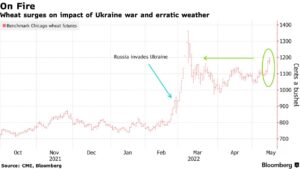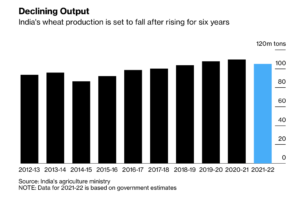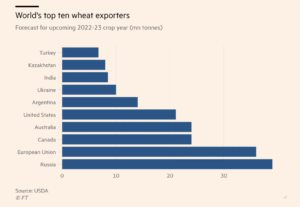Tariffs imposed by the Trump administration collected an estimated $958 million in revenue from selected agricultural inputs from February to October of 2025, according to North Dakota State University's monthly…
India Bans Wheat Exports
Bloomberg writer Pratik Parija reported today that, “India prohibited wheat exports that the world was counting on to alleviate supply constraints sparked by the war in Ukraine, saying that the nation’s food security is under threat.
Exports will still be allowed to countries that require wheat for food security needs and based on the requests of their governments, India’s Directorate General of Foreign Trade said in a notification dated May 13. All other new shipments will be banned with immediate effect.
“The decision to halt wheat exports highlights India’s concerns about high inflation, adding to a spate of food protectionism since the war started. Governments around the world are seeking to ensure local food supplies with agriculture prices surging. Indonesia has halted palm oil exports, while Serbia and Kazakhstan imposed quotas on grain shipments.”

The Bloomberg article explained that, “Shipments with irrevocable letters of credit that have already been issued will still be allowed, according to the latest notification. Traders have contracted to export 4 million tons so far in 2022-23, the food ministry said on May 4. After Egypt, Turkey has also given approval to import wheat from India, it said.”

Parija added that, “Hundreds of acres of wheat crops were damaged during India’s hottest March on record, causing yields to potentially slump by as much as 50% in some pockets of the country, according to a Bloomberg survey. ”
Reuters writer Nigam Prusty reported today that, “Indian government officials, speaking just hours after the country banned wheat exports, said there was no dramatic fall in wheat output this year but unregulated exports had led to a rise in local prices.
“‘We don’t want wheat trade to happen in an unregulated manner or hoarding to happen,’ a senior government official told reporters in New Delhi on Saturday.
“The government said it would still allow exports backed by already issued letters of credit and to countries that request supplies ‘to meet their food security needs.'”
And Wall Street Journal writer Vibhuti Agarwal reported today that,
India said it would ban wheat exports, in a move that will add to global inflationary pressure and further strain global food supplies that have been disrupted by the war in Ukraine.
“‘The food security of India, neighboring and other vulnerable countries is at risk,’ India’s Directorate General of Foreign Trade said in a notice on Friday explaining the ban.
“Global buyers are depending on India—the world’s second-biggest producer of wheat—for supplies after shipments from the Black Sea region have dropped since the Russian invasion of Ukraine in late February. The United Nations has warned the world faces potential food shortages.”
The Journal article stated that, “The disruptions due to the crisis have driven up the prices of wheat and other commodities globally. In April, India’s wheat prices hit their highest level since 2010. After five years of bumper crops, a searing heat wave and a lack of rain have reduced yields. Authorities say the rise in prices has led to hoarding by some wheat traders.
“Last week, the Indian government lowered its wheat production estimate by 5.7% to 105 million metric tons for the crop year ending June. The government had earlier projected wheat production at a record of about 111 million tons, which would have made it the sixth season in a row to produce a surplus. India produced nearly 110 million tons of wheat in the previous crop year.”
Financial Times writers Emiko Terazono and Benjamin Parkin reported today that, “India has banned exports of wheat, in a move that is likely to push food prices higher and fuel hunger in poor countries that depend on imports of the commodity.”

The FT article indicated that, “Traders predicted chaotic trading on the international wheat markets when they open at the start of next week as the ban would be a blow to buyers looking for wheat supplies. ‘It’s an absolute bombshell,’ said Swithun Still, a grain trader based in Switzerland. ‘There will be panic on the wheat futures markets when they open,’ he added.”





